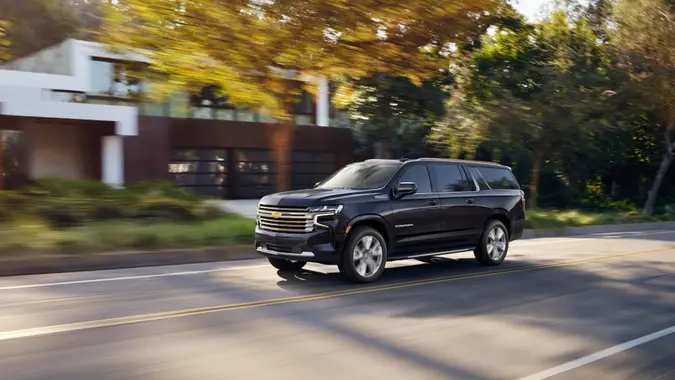The Worst Car for Every Age Group, According to Experts

Commitment to Our Readers
GOBankingRates' editorial team is committed to bringing you unbiased reviews and information. We use data-driven methodologies to evaluate financial products and services - our reviews and ratings are not influenced by advertisers. You can read more about our editorial guidelines and our products and services review methodology.

20 Years
Helping You Live Richer

Reviewed
by Experts

Trusted by
Millions of Readers
Every car buyer has an automotive soul mate, and if you’re in the market for a new set of wheels, the perfect car for your needs, budget and style is out there somewhere. The problem is that it’s just as easy to drive home with the wrong vehicle.
So, what makes a new car the wrong choice for someone?
GOBankingRates spoke with two auto industry veterans who think a lot of it depends on your age and where you are in life. They cautioned against buying the following cars, which don’t jive well with their corresponding age groups.
20s: Chrysler PT Cruiser
Most 20-somethings would probably love to drive a vehicle that makes a statement, but that’s hard to do on the average young person’s budget. With that in mind, the Chrysler PT Cruiser — discontinued in 2010 — might be an attractive choice for young drivers. Kelley Blue Book (KBB) estimates a 2010 model will cost only around $4,100, and unlike most 15-year-old used cars, a PT Cruiser is sure to turn heads — for good looks or bad. But even those who adore the throwback’s love-it-or-hate-it stylings, it might be the wrong choice.
“Young drivers might wish for low-maintenance, reasonably priced vehicles like Chrysler PT Cruisers,” said Erin Kemp, consumer advocate for vehicle history platform Bumper. “Although the Chrysler PT Cruiser has a distinctive vintage design, its engine and gearbox problems have been known to need expensive repairs. It may not be the ideal option for somebody trying to follow a budget.”
30s: Nissan Rogue
Growing families and active lifestyles steer many 30-somethings toward midsize SUVs. With a sub-$30,000 starting MSRP and rugged good looks, the popular Nissan Rogue might appear to be a solid choice — but RepairPal ranks it at just 13 out of 36 midsized SUVs in terms of reliability.
“Many in their 30s search for dependability and family friendly aspects in their vehicles,” said Kemp. “Popular as the Nissan Rogue is, it has been claimed to have transmission and electrical problems that might be costly to repair, with prices ranging from $3,500 to $8,000. For this age range, these possible repair costs might make this a less-desirable choice.”
40s: Chevrolet Camaro
When you reach 40, you might feel like your youth is slipping away — and nothing screams vibrance and virility like the growling, rumbling, revving of a Camaro. GM canceled the iconic American muscle car, which makes 2024 its final model year. With a starting MSRP under $31,000, many 40-somethings might be able to afford it — but that doesn’t mean they should buy one.
“A mid-life crisis may make you want a sports car, but you need a practical car in your 40s,” said Melanie Musson, an auto industry expert with CarInsurance.org.
Not only does gas mileage bottom out at 16 mpg, but KBB points to its poor visibility and “useless” back seat as reasons why the Chevy Camaro is anything but a practical choice.
50s: Chrysler 200
Before it was discontinued in 2017, the Chrysler 200 was known as a midsize sedan with luxurious features, European-inspired handling and authentically American style. That might sound tempting to drivers in their 50s who are entering the age of sophistication — especially since KBB reports the fair market value of a 2017 model is only around $12,000.
However, RepairPal ranks it just 12th out of 24 cars in its class for reliability.
“Drivers in their 50s generally give comfort and dependability high importance,” said Kemp. “Although the Chrysler 200 has a comfortable ride, it is also well-known for engine and gearbox problems, which might need more regular repairs. One might want to give alternative models that show a little more reliability some thought.”
60s and Beyond: Chevrolet Suburban
If your retirement includes traveling, towing a boat or shuttling grandkids to and from sports and activities, you might be inclined to get a full-size SUV — and if you’re going to go big, you might as well go gargantuan with a Chevy Suburban, right?
Not necessarily. First of all, big cars have big price tags, and a new Suburban starts at $61,500. Also, while it’s undeniably a beast of a vehicle, that chief selling point can also be its primary drawback.
“A Suburban is too big to be practical as you age,” said Musson. “It gets poor fuel mileage and can be hard to climb into and get out of.”
 Written by
Written by  Edited by
Edited by 

























